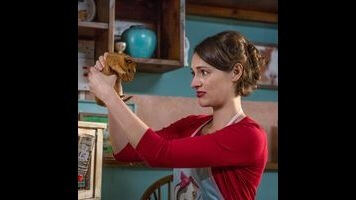The titular character of Amazon’s Fleabag spends her days aimlessly pursuing terrible men, struggling to connect with her sister, and watching the café that she owns fail. It’s another entry into the growing canon of really wonderful comedies that also make you want to cry, the sort of show that makes you write down a note like “cheerfully nihilistic.”
The British import is also, thankfully, quite funny. Star and creator Phoebe Waller-Bridge—whom stateside viewers might recognize from turns in The Iron Lady and Albert Nobbs—turns out to be that unique kind of performer whose screen presence is effortlessly magnetic. (Read our interview with Waller-Bridge here.) She’s surrounded by an excellent supporting cast, with Bill Paterson, as her father, turning in a note-perfect rendition of a repressed, distant dad who can barely manage to share a room with his loud, chaotic daughter.
And chaotic she surely is. She casually steals a statue from her heinous stepmother (Olivia Colman), gently torments her uptight sister, and is incapable of taking anything seriously. But even with these moments, funny as they are, a deeper melancholy pervades the show. It begins to become clear that there’s a reason she’s keeping the world at a distance. Her mother died at a young age, and that’s certainly part of it, but the show pulls the rug out from under viewers at the end of the pilot by revealing that the tragedy tearing its main character apart is an entirely different one.
Over time, the show starts to coalesce into a meditation on loneliness and the isolation of loss. Fleabag, as she’s credited (you’re unlikely to catch anyone calling her by name during the show), is struggling not just with the untimely death of someone she cared about but also the loss of that person’s role in her life. There’s a hole at the center of things, and no amount of hijinks can fix it.
The winking lack of a name is just one small sign of the degree to which this is a first-person show. Fleabag breaks the fourth wall repeatedly, often with a snide one-liner, but unlike the “sane man in a sea of weirdos” looks Jim Halpert constantly gave on The Office, she’s just as likely to express enthusiasm or excitement as any degree of disdain. Men might say ridiculous things to her, but that doesn’t mean she’s not interested in their attention. The holes in the fourth wall aren’t the only way the show breaks with tradition. It uses flashbacks with a particularly brutal efficiency. There’s often no warning when they’re going to appear, and while many are funny, a sense of impending doom begins to invade them as the show goes on.
Waller-Bridge has a bracing willingness to let entire scenes play out just to build to one absurd joke at the end, and she proves adept at giving characters and moments the touch of specificity that makes them feel real and human. Her stepmother isn’t just awful—it’s the way she’s awful: repeatedly referencing Fleabag’s parents breaking up, when the reason she’s with Fleabag’s father is that her mother died. Or when Fleabag and her sister, Claire (Sian Clifford, doing subtle but appealing work as the straight man), reminisce about their mother’s flatulence. “A door opening or suspicious duck?” asks Claire when Fleabag opines that she’s beginning to fart like their mother.
If Fleabag has a flaw, it’s that the various tragedies in the character’s life gather together a little too tidily. It’s the rare story that employs a sad ending too easily, with the various threads of her damaged relationships all fraying at the same time. The ultimate reveal of what’s going on with Fleabag feels obvious by the time it appears, and the actual most heartbreaking moment on the show is an earlier scene with a minor character in which Waller-Bridge says almost nothing. But that moment is so powerful it mostly makes up for the melodrama that follows. Regardless of how funny you find Fleabag’s adventures, it is likely to be the scene that stays with you longest after you’ve finished watching, and is the strongest sign that Waller-Bridge is emerging as a major talent. It’s an impressively well-written scene that neither pushes the bounds of what seems realistic in the moment nor suggests that life has any kind of easy answers.
It’s also a rallying cry for the importance of human connection, and a forgiveness of human frailty, that suggests that Fleabag could find what she needs, if she just stopped getting in her own way. Of course, that kind of mature development would preferably be stretched out over quite a few more scenes of her misbehaving around far more dignified people.









































